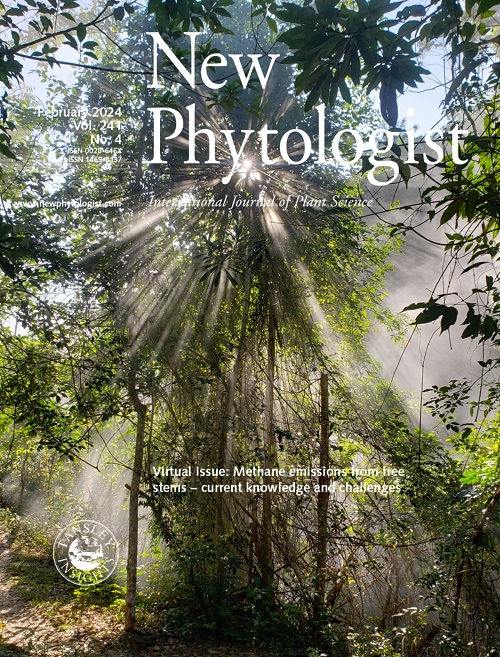Allelochemicals and soil microorganisms jointly mediate sex-specific belowground interactions in dioecious Populus cathayana
IF 8.1
1区 生物学
Q1 Agricultural and Biological Sciences
引用次数: 1
Abstract
- Little is known about how sex differences in root zone characteristics, such as contents of allelochemicals and soil microbial composition, mediate intra- and intersexual interactions in dioecious plants.
- We examined the processes and mechanisms of sex-specific belowground interactions mediated by allelochemicals and soil microorganisms in Populus cathayana females and males in replicated 30-yr-old experimental stands in situ and in a series of controlled experiments.
- Female roots released a greater amount and more diverse phenolic allelochemicals into the soil environment, resulting in growth inhibition of the same sex neighbors and deterioration of the community of soil microorganisms. When grown with males, the growth of females was consistently enhanced, especially the root growth. Compared with female monocultures, the presence of males reduced the total phenolic accumulation in the soil, resulting in a shift from allelopathic inhibition to chemical facilitation. This association was enhanced by a favorable soil bacterial community and increased bacterial diversity, and it induced changes in the orientation of female roots.
- Our study highlighted a novel mechanism that enhances female performance by males through alterations in the allelochemical content and soil microbial composition. The possibility to improve productivity by chemical mediation provides novel opportunities for managing plantations of dioecious plants.
等位化学物质和土壤微生物共同介导异株杨性别特异性地下相互作用
关于根区特征的性别差异,如化感物质含量和土壤微生物组成,如何介导雌雄异株植物的性内和性间相互作用,目前知之甚少。我们在30年生的原位和一系列对照实验中,研究了化感物质和土壤微生物介导的山杨雌性和雄性性别特异性地下相互作用的过程和机制。雌根向土壤环境中释放了大量多样的酚类化感物质,导致同性邻居的生长受到抑制,土壤微生物群落恶化。与雄性一起生长时,雌性的生长持续增强,尤其是根系的生长。与雌性单一栽培相比,雄性的存在减少了土壤中总酚的积累,导致从化感抑制向化学促进的转变。有利的土壤细菌群落和增加的细菌多样性增强了这种联系,并诱导了雌根方向的变化。我们的研究强调了一种新的机制,即通过改变化感化学物质含量和土壤微生物组成来提高雄性的雌性表现。通过化学中介提高生产力的可能性为管理雌雄异株植物的种植园提供了新的机会。
本文章由计算机程序翻译,如有差异,请以英文原文为准。
求助全文
约1分钟内获得全文
求助全文
来源期刊

New Phytologist
PLANT SCIENCES-
CiteScore
17.60
自引率
5.30%
发文量
728
审稿时长
1 months
期刊介绍:
New Phytologist is a leading publication that showcases exceptional and groundbreaking research in plant science and its practical applications. With a focus on five distinct sections - Physiology & Development, Environment, Interaction, Evolution, and Transformative Plant Biotechnology - the journal covers a wide array of topics ranging from cellular processes to the impact of global environmental changes. We encourage the use of interdisciplinary approaches, and our content is structured to reflect this. Our journal acknowledges the diverse techniques employed in plant science, including molecular and cell biology, functional genomics, modeling, and system-based approaches, across various subfields.
 求助内容:
求助内容: 应助结果提醒方式:
应助结果提醒方式:


